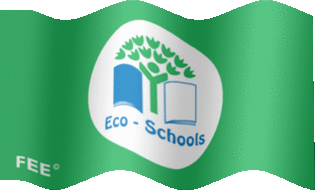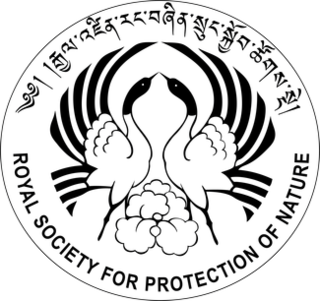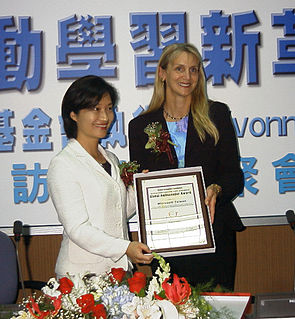The Arbor Day Foundation is a 501(c)(3) nonprofit conservation and education organization founded in 1972 in Nebraska, United States, by John Rosenow. It is the largest nonprofit membership organization dedicated to tree planting. The Foundation's stated corporate mission is "to inspire people to plant, nurture, and celebrate trees." The Foundation programs are supported by members, donors, and corporate sponsors that share the same vision of a healthier and greener world.
The Green Belt Movement (GBM) is an indigenous, grassroots, non-governmental organization based in Nairobi, Kenya that takes a holistic approach to a development by focusing on environmental conservation, community development and capacity building. Professor Wangari Maathai established the organization in 1977, under the auspices of the National Council of Women of Kenya.
The Norwegian University of Life Sciences is a public university located in Ås, Norway. It is located at Ås in Akershus, near Oslo, and at Adamstuen in Oslo and has around 5,000 students.

Outdoor education usually refers to organized learning that takes place in the outdoors. Outdoor education programs sometimes involve residential or journey wilderness-based experiences in which students participate in a variety of adventurous challenges and outdoor activities such as hiking, climbing, canoeing, ropes courses and group games. Outdoor education draws upon the philosophy, theory, and practices of experiential education and environmental education.

Environmental education (EE) refers to organized efforts to teach how natural environments function, and particularly, how human beings can manage behavior and ecosystems to live sustainably. It is a multi-disciplinary field integrating disciplines such as biology, chemistry, physics, ecology, earth science, atmospheric science, mathematics, and geography. The United Nations Educational, Scientific and Cultural Organisation (UNESCO) states that EE is vital in imparting an inherent respect for nature amongst society and in enhancing public environmental awareness. UNESCO emphasises the role of EE in safeguarding future global developments of societal quality of life (QOL), through the protection of the environment, eradication of poverty, minimization of inequalities and insurance of sustainable development. The term often implies education within the school system, from primary to post-secondary. However, it sometimes includes all efforts to educate the public and other audiences, including print materials, websites, media campaigns, etc.. There are also ways that environmental education is taught outside the traditional classroom. Aquariums, zoos, parks, and nature centers all have ways of teaching the public about the environment.

Eco-Schools is an international programme of the Foundation for Environmental Education (FEE) that aims to empower students to be the change our sustainable world needs by engaging them in fun, action-orientated and socially responsible learning.
American Forests is a 501(c)(3) non-profit conservation organization, established in 1875, and dedicated to protecting and restoring healthy forest ecosystems. The current headquarters are in Washington, D.C.
Rural Action is a non-governmental organization working in Appalachian Ohio promoting economic, social and environmental justice. The organization envisions a region of clean streams, healthy forests, thriving family farms, meaningful jobs for everyone and lively towns that remember local history and celebrate their stories.

The Royal Society for the Protection of Nature (RSPN) is Bhutan's first and only non-governmental organization nonprofit organization with nationwide operations.
This article includes information about environmental groups and resourcesthat serve K–12 schools in the United States and internationally. The entries in this article are for broad-scope organizations that serve at least one state or similar region.
Environmental adult education is recognized as a "hybrid outgrowth of the environmental movement and adult education, combining an ecological orientation with a learning paradigm to provide a vigorous educational approach to environmental concerns."

Teatown Lake Reservation is a nonprofit nature preserve and environmental education center in Westchester County, New York, in the United States. The reservation includes an 1,000-acre (4.0 km2) nature preserve and education center located in the Westchester towns of Yorktown, Cortlandt, and New Castle. About 25,000 people come each year to hike the preserve's 15 miles (24 km) of trails, attend an education program, visit the Nature Center, or tour "Wildflower Island". Teatown's educators offer adult, family and children's programs to 20,000 participants annually, including nearly 6,000 schoolchildren and 700 summer camp students.
The Forest History Society is an American non-profit organization dedicated to the preservation of forest and conservation history. The society was established in 1946 and incorporated in 1955.
Young Reporters for the Environment is a programme of the Foundation for Environmental Education. An international network of youth in more than 25 countries, it promotes solutions to today’s environmental issues through investigative journalism.
Sustainability organizations are (1) organized groups of people that aim to advance sustainability and/or (2) those actions of organizing something sustainably. Unlike many business organizations, sustainability organizations are not limited to implementing sustainability strategies which provide them with economic and cultural benefits attained through environmental responsibility. For sustainability organizations, sustainability can also be an end in itself without further justifications.

Dr. Yvonne Marie Andrés is an American educator who is recognized as an e-learning pioneer and visionary. Andrés is the co-founder of the non-profit Global SchoolNet (1984) and the founder of the Global Schoolhouse (1992). Andrés was named one of the 25 most influential people worldwide in education technology and was invited to meet with President Bush to launch the Friendship Through Education initiative (2000). Andrés is the creator and producer of International CyberFair and the US State Department’s Doors to Diplomacy program. Andrés frequently writes about highly effective education programs from around the globe that blend online and offline learning, while incorporating the latest neuroplasticity findings and Constructivist Learning methodology. Andrés has provided leadership throughout the US, Canada, Asia, Europe, Australia, South America and Africa and in 2007 Andrés was awarded the Soroptimist International Making a Difference Award for advancing the status of women and children. In August 2012 Andrés was selected as one of San Diego Magazine's Women Who Move the City, recognizing dynamic women who create positive change and contribute to the community.
Project Learning Tree (PLT) was created in 1976, after passage of the first National Environmental Education Act in 1970 and celebration of the first Earth Day in 1970, raised the profile of environmental education in the United States.
Tree Canada is a non-profit charitable organization which promotes the planting and nurturing of trees in Canada's urban and rural areas. It provides tree-related education, technical assistance and resources to communities, corporations, individuals and non-profit organizations.








